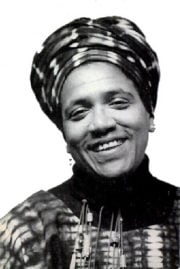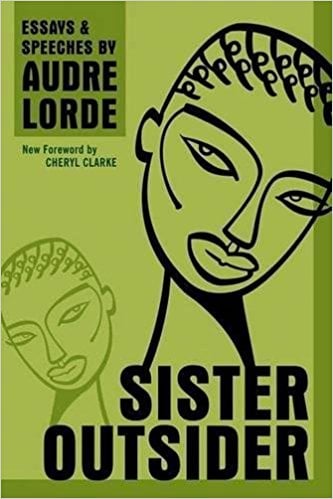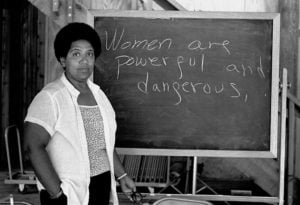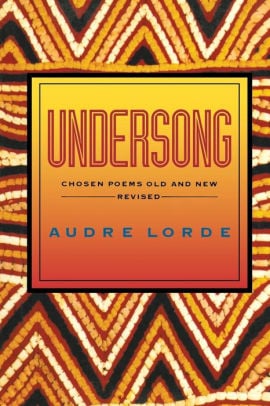Poetry & Politics: Quotes by Audre Lorde
By Emma Ward | On May 27, 2017 | Updated October 17, 2022 | Comments (0)

Audre Lorde, self-identified as a Black lesbian feminist, used literature to spread ideas of intersectionality during the political movements of the mid-to-late 20th century. Following is a selection of quotes by Audre Lorde that straddle the worlds of poetry and politics.
A child of parents from the West Indies in New York City, Lorde started her writing career young and went on to teach as well as becoming involved in political activism through her work and organizations she helped found.
As the anti-war, feminist, and civil rights movements progressed, Lorde’s writings melded the political and personal. She used her platform as a writer to spread ideas about intersecting oppressions and experiences faced especially by women of color.
. . . . . . . . . .
“For the master’s tools will never dismantle the master’s house. They may allow us to temporarily beat him at his own game, but they will never enable us to bring about genuine change. Racism and homophobia are real conditions of all our lives in this place and time. I urge each one of us here to reach down into that deep place of knowledge inside herself and touch that terror and loathing of any difference that lives here. See whose face it wears. Then the personal as the political can begin to illuminate all our choices.”
. . . . . . . . . .
“We have been raised to fear the yes within ourselves, our deepest cravings.”
. . . . . . . . . .
“My sexuality is part and parcel of who I am, and my poetry comes from the intersection of me and my worlds . . . Jesse Helms’ objection to my work is not about obscenity . . .or even about sex. It is about revolution and change . . . Helms knows that my writing is aimed at his destruction, and the destruction of every single thing he stands for.”
. . . . . . . . . .
“Imposed silence about any area of our lives is a tool for separation and powerlessness.” (The Cancer Journals, 1980)
. . . . . . . . . .

. . . . . . . . . .
“If I didn’t define myself for myself, I would be crunched into other people’s fantasies for me and eaten alive.”
“Black and Third World people are expected to educate white people as to our humanity. Women are expected to educate men. Lesbians and gay men are expected to educate the heterosexual world. The oppressors maintain their position and evade their responsibility for their own actions. There is a constant drain of energy which might be better used in redefining ourselves and devising realistic scenarios for altering the present and constructing the future.” (Sister Outsider)
. . . . . . . . . .
“It is not our differences that divide us. It is our inability to recognize, accept and celebrate those differences.”
. . . . . . . . . .
“My silences had not protected me. Your silence will not protect you. But for every real word spoken, for every attempt I had ever made to speak those truths for which I am still seeking, I had made contact with other women while we examined the words to fit a world in which we all believed, bridging our differences.” (The Cancer Journals)
. . . . . . . . . .
“Black women are programmed to define ourselves within this male attention and to compete with each other for it rather than to recognize and move upon our common interests.”
. . . . . . . . . .
“I write for those women who do not speak, for those who do not have a voice because they were so terrified, because we are taught to respect fear more than ourselves. We’ve been taught that silence would save us, but it won’t.”
. . . . . . . . . .
10 Thought-Provoking Quotes from Sister Outsider
. . . . . . . . . .
“Black writers, of whatever quality, who step outside the pale of what Black writers are supposed to write about, or who Black writers are supposed to be, are condemned to silences in back literary circles that are as total and as destructive as any imposed by racism.”
. . . . . . . . . .
“Words had an energy and power and I came to respect that power early. Pronouns, nouns, and verbs were citizens of different countries, who really got together to make a new world” (Denver Quarterly, 1981)
. . . . . . . . . .
“I have come to believe over and over again that what is most important to me must be spoken, made verbal and shared, even at the risk of having it bruised or misunderstood.”
. . . . . . . . . .
“I loved poetry, and I loved words. But what was beautiful had to serve the purpose of changing my life, or I would have died. If I cannot air this pain and alter it, I will surely die of it. That’s the beginning of social protest” (Black Women Writers at Work, 1983)
. . . . . . . . . .

. . . . . . . . . .
“I am not free while any woman is unfree, even when her shackles are very different from my own.”
. . . . . . . . . .
“Pain is important: how we evade it, how we succumb to it, how we deal with it, how we transcend it.”
. . . . . . . . . .
“The failure of academic feminists to recognize difference as a crucial strength is a failure to reach beyond the first patriarchal lesson. In our world, divide and conquer must became define and empower.”
. . . . . . . . . .
“Poetry is not only a dream and vision; it is the skeleton architecture of our lives. It lays the foundations for a future of change, a bridge across our fears of what has never been before.”
. . . . . . . . . .
See also: Five Politically-Inspired Poems by Audre Lorde
. . . . . . . . . .
“When I dare to be powerful, to use my strength in the service of my vision, then it becomes less and less important whether I am afraid.”
“Without community, there is no liberation.”
. . . . . . . . . .
“I cannot hide my anger to spare you guilt, nor hurt feelings, nor answering anger; for to do so insults and trivializes all our efforts. Guilt is not a response to anger; it is a response to one’s own actions or lack of action. If it leads to change then it can be useful, since it is then no longer guilt but the beginning of knowledge.” (Sister Outsider)
. . . . . . . . . .
“and when we speak we are afraid
our words will not be heard
nor welcomed
but when we are silent
we are still afraid
So it is better to speak
remembering
we were never meant to survive”
. . . . . . . . . .
“I began to ask each time: “What’s the worst that could happen to me if I tell this truth?” Unlike women in other countries, our breaking silence is unlikely to have us jailed, “disappeared” or run off the road at night. Our speaking out will irritate some people, get us called bitchy or hypersensitive and disrupt some dinner parties. And then our speaking out will permit other women to speak, until laws are changed and lives are saved and the world is altered forever.
Next time, ask: What’s the worst that will happen? Then push yourself a little further than you dare. Once you start to speak, people will yell at you. They will interrupt you, put you down and suggest it’s personal. And the world won’t end.”
. . . . . . . . . .
. . . . . . . . . .
“… you will find you have fallen in love with your own vision, which you may never have realized you had. And you will lose some friends and lovers, and realize you don’t miss them. And new ones will find you and cherish you. And you will still flirt and paint your nails, dress up and party, because, as I think Emma Goldman said, “If I can’t dance, I don’t want to be part of your revolution.” And at last you’ll know with surpassing certainty that only one thing is more frightening than speaking your truth. And that is not speaking.”
. . . . . . . . . .
“Caring for myself is not self-indulgence, it is self-preservation, and that is an act of political warfare.”
. . . . . . . . . .
“There is no thing as a single-issue struggle because we do not live single-issue lives.”



Leave a Reply